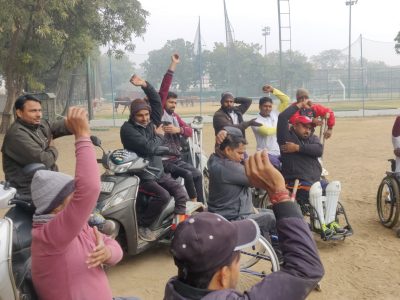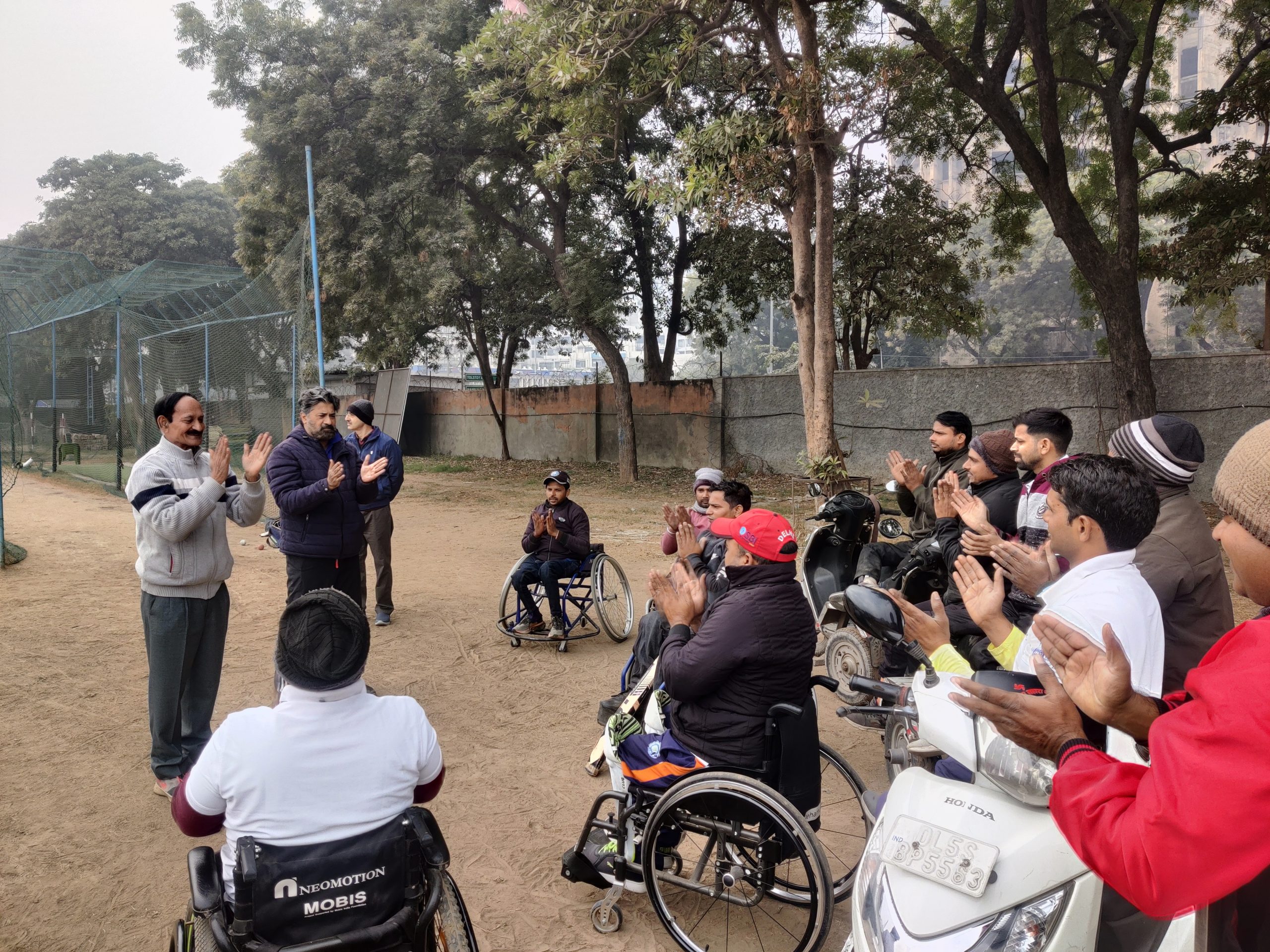On Saturday and Sunday mornings every week, over 70 differently abled athletes gather at the Modern School, Barakhamba Road — a school with arguably the best sports facilities in the Capital — to play various games.
They indulge in wheelchair sports including cricket, football, basketball, badminton and table tennis, apart from cricket for the visually challenged boys and girls and para swimming.
The cricket team has already shown potential, winning the inaugural eight-team competition at the second Purple Fest last month in Goa, defeating favourites Karnataka in the final after having topped their group in league phase.
The matches were played with a cricket ball, something that the players here practice with every weekend. The team had earlier finished third in the national championships in Udaipur that was organised by an NGO.

Sonu Gupta, a disabled cricketer, who has captained Delhi and India in the category earlier and was a senior member of the team that won in Goa, comes to the school from his home in east Delhi’s Jhilmil Colony every weekend.
“Many of us have vehicles, that is, scooties (gearless scooters). Some who don’t, have to ride pillion with others to come to the venue,” says Gupta, who was struck by polio as a two-year-old in his village near Kanpur.
Gupta, 37, who has been playing wheelchair cricket for 11 years, was brought to Delhi by his father in 1994 for better prospects. He studied and worked here.
“I used to play sitting on the floor with a bat that I had made with wood from the school bench. I started playing cricket with the tennis ball. We used to make wickets with bricks like every child used to in the neighbourhood. It was only after I started learning the basics of wheelchair in school that I began playing cricket on the wheelchair. We had to learn how to move and turn,” says Gupta, whose wife is a wheelchair table tennis player and also trains at the Modern School facility.
Gupta says that Delhi was among the first to come up with the wheelchair cricket team.
“Now there are 22 teams across the country. The nationals saw 16 teams. We came third,” he said further.
Bowler Saurabh Malik, who was struck by polio at the age of six months, was the star of the final, picking four wickets. He was also the star player of the tournament scoring 114 runs and picking nine wickets.
Almost everyone, including Malik and current Delhi captain Prashant Singh, started playing cricket by observing others.
Prashant would play cricket in his neighbourhood with friends, but five-six years ago when he got to know about wheelchair cricket, he dedicated himself to it completely.

All these players practice batting and bowling on wheelchairs at the school nets with an attendant helping them put on their gear.
Cricketers aren’t the only ones blossoming. Para badminton players like Munna Khalid, Charanjeet Kaur and Adbhut Jangid have also done well.
Khalid won a bronze medal in Khelo India Para Games and will participate in Para Badminton World Championships in Thailand in February, 2024, while Charanjeet and Jangid went to competitions for para athletes in Uganda and Japan and returned with medals.
“We are trying to make sports accessible to the disabled. The problem with most of these athletes is that they don’t have much access to playgrounds and facilities in Delhi. So, we have created access and training programmes for the players. We also provide coaches besides facilities,” said Lokesh Jurel, who is in charge of the programme called ‘Sportability’ that was started by the school management on May 7, 2022 and under which all the differently abled people are learning and practicing sports.
Jurel studied sports science at the bachelors’ level and is involved with the framing and implementation of the programme.
“We admit those with intellectual disability, development delays and para athletes.”
Jurel says that there are many who come here with the object of learning a sport without having played one before.
Ayush Kumar is one of them. He came to the school as a 13-year-old on a wheelchair. He had suffered spinal cord injury due to which he lost sense of daily activities, even like answering to the call of nature.
Kumar came to the school academy on August 4, 2022 without any knowledge of any sport but by December-end, 2022 – that is within five months — he had already won medals at the national level in 100 metres and 50 metres breaststroke events in his category.
He also won gold in para badminton later at the state level and couldn’t compete at the national level since his category didn’t exist there.
“We first find out if the child suffers from intellectual or physical disability. We then go through a three-stage process. In the first stage, we give them experience of all the sports, then in the second stage we teach them a set of skills for each game and check which sport’s features pair up with his skills,” explains Jurel.
“The final stage,” he adds, “is training them for the sport that they are best suited for like wheelchair cricket, swimming, blind cricket, judo.”
Naresh Sachdeva, who was the Director, Physical Education of Modern School, Barakhamba Road till 10 years ago, and now looks after the coaching of differently abled athletes under ‘Sportability’ programme, says, “We also ask them to do yoga and meditation. The idea is to help them gain physical strength and also improve psychologically. It is showing. They are not just learning skills but also enjoying themselves. Children who would have spinal injury are now swimming.”
The school Principal, Vijay Datta, also attends their training.
“We don’t charge the players and it is open to everyone with special needs. Infrastructure is provided by the school free of cost. Refreshments and other things are also provided by the school. If the team or a player qualifies to represent Delhi, then the finances are taken care of by the school,” says Datta who also offers advice and guidance to the differently abled trainees during weekends. He also leads them in yoga sessions and also gives pep talks.
“The idea was mooted by one of the school’s board members, Ambika Pant. We thought it would be a nice initiative.”
The school didn’t have to advertise and the word spread within the community quite quickly.
“It is not just the basic expenses that are taken care of. The Principal has ensured that even their travel expenses are met by the school programme. Like the cricket team’s trip to Purple Fest was funded by the school,” adds Sachdeva.





